Iran’s Exiled Prince Urges UK To Proscribe The IRGC
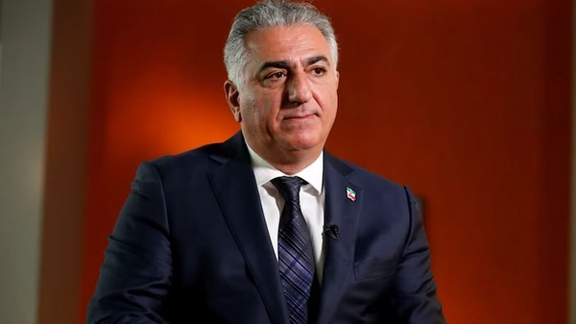
Iran’s exiled Prince Reza Pahlavi has called on Britain to designate Iran’s IRGC as a terrorist group, saying it would be akin to “pulling out the regime’s biggest tooth.”

Iran’s exiled Prince Reza Pahlavi has called on Britain to designate Iran’s IRGC as a terrorist group, saying it would be akin to “pulling out the regime’s biggest tooth.”
Speaking to The Sunday Telegraph during a brief trip to London on Saturday, he argued that when it comes to proscribing the IRGC, Europe is being slow to act because it underestimates the importance of such a move.
Designating the IRGC would mean “more pressure in paralyzing the regime that is depending on this instrument of coercion at home and abroad to do the sinister deeds whether it is Syria or Lebanon, or in Iran itself,” the prince noted.
The United States has already listed the IRGC as a Foreign Terrorist Organization, but debate in Europe continues over such a move.
He said that for the first time since the Iranian revolution in 1979 the factors are in place for the Islamic Republic to be ousted. “I think the alignment of stars is now there. The opportunity is right in front of us,” he underlined.
Not only have the “reformists of yesteryear” from within Iran now come around to the idea of total regime change, but the West has also warmed to the idea, he stressed.
“A lot of people question what can come after, rightfully so,” he said. “But I think that Iran has all the ingredients and tools to fill the void in terms of the intelligentsia, in terms of positions that they can immediately fill for transitional governance, specialists [in] the economy, environment, transitional justice as well as constitutional law.”
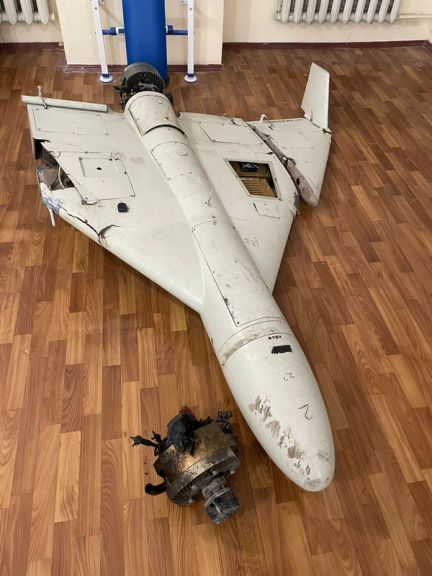
The UK has sanctioned 92 individuals and entities over the Russian invasion of Ukraine, including export bans on items Kiev has found Moscow is using on the battlefield.
The new sanctions, which were announced to mark the one-year anniversary of the aggression in Ukraine, designated 80 people, including senior executives of Russian state-owned nuclear power company Rosatom as well as five senior Iranian executives of Qods Aviation Industry, a subsidiary company of Iran Aviation Industries Organization, which manufactures drones used in Ukraine.
Foreign Secretary James Cleverly announced on Friday the new package of internationally coordinated sanctions and trade measures, including import bans on 140 goods such as iron and steel products processed in third countries.
The statement by the Foreign Secretary said that the sanctions on Iranian officials demonstrates their commitment to continue to pressure third countries supplying Russia’s military.
Managing Director of Qods Aviation Industry Company Ghassem Damavandian, and some board members of the company, namely Vali Arlanizadeh, Reza Khaki, Majid-Reza Niyazi-Angili, and Hamidreza Sharifi-Tehrani, are the Iranians included in the new batch of sanctions.
Earlier in February, Britain imposed sanctions on three Iranian judges, three members of Iran's Islamic Revolutionary Guard Corps and two regional governors. Those added to the sanctions list are subject to an asset freeze and travel ban. The list of sanctioned individuals includes IRGC members, such as the commander of provinces in which security forces have severely injured and killed children.
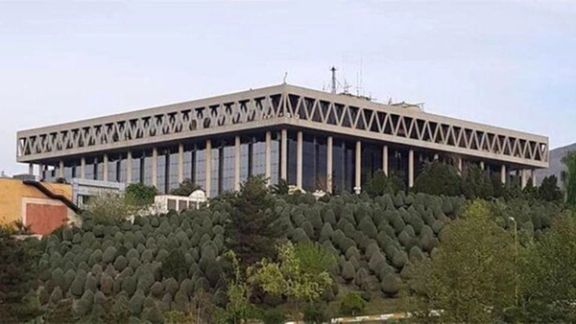
Washington says it has renewed a waiver of sanctions against Iran’s state radio and television establishment, the IRIB, on the basis of US national interests.
State Department spokesperson Ned Price said during his press briefing on Thursday that the US periodically reviews this waiver to allow the provision of satellite broadcast service to the IRIB under the auspices of the International Telecommunications Satellite Organization, or ITSO.
Trying to justify the decision by the administration, he said that "this waiver has been renewed by successive American administrations without any interruption since 2014. The waiver has been issued close to 20 times – some 18 or so times – in recent years.”
Despite Price’s claim that Washington uses every single available tool to hold Iranian authorities accountable for their human rights abuses and for their censorship, the waiver seems to contradict repeated pledges to support the Iranians who for over five months have been protesting against the regime and its leaders.
The sanctions waiver raises more questions as Price said, “We are and remain seriously concerned by the IRIB’s role in censoring the Iranian people’s access to information and its involvement in human rights abuses.”
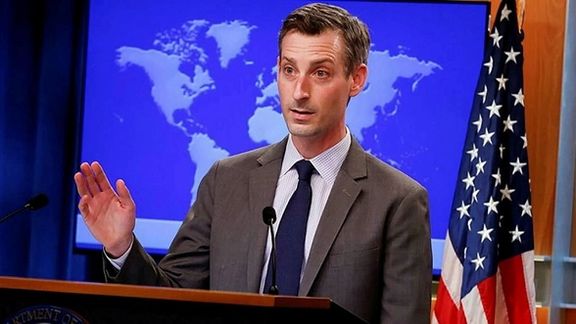
With a wording meant to minimize the effects of the waiver, Price said that “While this narrow waiver allows for the provision of satellite broadcast services to IRIB, IRIB and its senior leadership remain subject to US sanctions under various authorities, including for their involvement in censorship and human rights abuses.” He was referring to a series of recent sanctions on IRIB officials, including its president Peyman Jebelli and the chief of the world service Ahmad Norouzi. Two brothers of Jebelli, close to Ali Khamenei's son Mojtaba, have recently defected and sought asylum in the US.
While the sanctions on leaders are important, the waiver for IRIB allows it to continue to broadcast regime propaganda and forced confessions of prisoners on international satellites.
Price dodged a direct answer about the reason behind the waiver, saying, “These are underlying conditions that we look at every time this waiver comes up for renewal. We ultimately are going to do what is in our interest but ultimately what we deem to be most effective to promote the aspirations of the Iranian people.”
Questioned to elaborate on these “national interests,” he only said that “these are complex issues involving our membership in the ITSO, involving a number of factors, but we look at this very carefully through every single lens.”
Defending the decision, he said, “we have made the judgment call, as have previous administrations multiple times over every 180 days, that waiving these sanctions are in our interest.” He continued, however, “We also believe it’s in the interest of our ability to protect, to promote the aspirations of the Iranian people.”
Amid measures targeting the Islamic Republic’s financial and energy sectors, under Executive Order 13846, by then President Donald Trump in 2018 after he withdrew the US from the 2015 Iran nuclear agreement – US government departments are empowered to sanction entities implicated in “censorship or other activities with respect to Iran on or after June 12, 2009, that prohibit, limit, or penalize the exercise of freedom of expression…or that limit access to print or broadcast media.”
The US first designated IRIB (Islamic Republic of Iran Broadcasting) in 2013, and in 2018 reimposed the move in what then Treasury Secretary Steven Mnuchin said was a part of “the maximum pressure exerted by the United States” after withdrawal from the 2015 nuclear agreement.
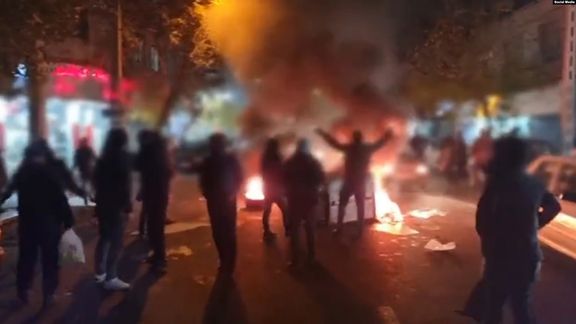
The European Union has slapped new sanctions on Iranian officials and entities for their role in the violent crackdown on the ongoing protests.
In a statement on Monday, the body also spelled out that those responsible for the killing of Mahsa Amini must be held accountable.
The EU called on the Iranian authorities to ensure “transparent” and “credible investigations” to clarify the number of deaths and arrests, to release all non-violent protestors and to provide due process to all detainees.
In addition, the declaration stressed that Tehran’s decision to restrict internet and block messaging platforms “violates the freedom of expression”.
The European Union imposed asset freezes and visa bans on 32 Iranian individuals and two entities including Iran's education and culture ministers in the latest round of sanctions against Tehran over its crackdown on demonstrators.
In total, EU sanctions now apply to 196 individuals and 33 entities in Iran.
Meanwhile, the British Foreign Secretary said the UK had "sanctioned several regime members involved in repressing and killing the Iranian people, including children."
The list of sanctioned individuals includes IRGC members, such as the commander of provinces in which security forces have severely injured and killed children. Three senior judges have also been sanctioned for imposing death penalties on protestors.
Since Mahsa Amini’s death in September 2022, the UK has imposed sanctions on more than 50 Iranian individuals and entities in response to human rights violations by the regime.
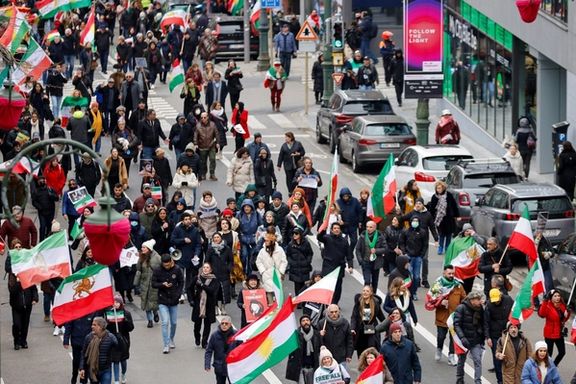
An estimated crowd of more than 20,000 held a rally in Brussels to call on EU countries to designate Iran’s Revolutionary Guard as a terrorist organization.
A diverse group of figures delivered speeches in the Belgian capital condemning the Islamic Republic and its multifunctional armed force, the IRGC, expressing solidarity with the dissidents in Iran who have been out on streets since September protesting for the fall of the clerical regime.
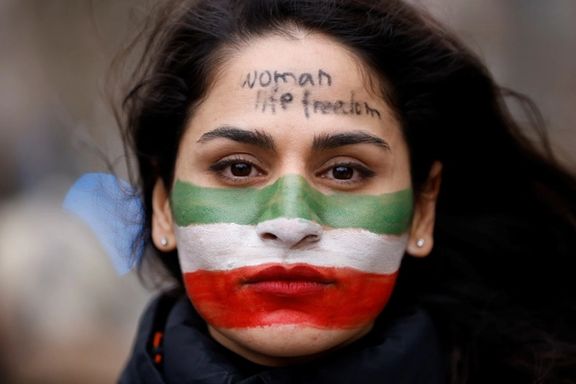
Alireza Akhondi and Darya Safai, two representatives of Iranian origin in the parliaments of Sweden and Belgium were among the original organizers of the rally, meant to push the EU for the inclusion of the IRGC in the list of terrorist organizations in the European Union.
During the demonstration – accompanied by musical and theatrical performances, women’s rights activist Masih Alinejad called for unity among Iranian opposition figures, a demand which has been echoed repeatedly by prominent activists since a historic forum in Washington earlier this month by eight prominent dissident activists heralded a united front.
Alinejad said, "The secret of our victory is our unity. We are scarred by the same regime for years... We will not win if we do not hold each other's hands."
Canada-based activist leader Hamed Esmaeilion, whose daughter and wife were killed by the IRGC in the shooting down of a Ukrainian airliner in 2020, said that the Revolutionary Guard was established to defend the Islamic Revolution and not the Iranian people. "There is still no mention of Iran in the name of this institution," he noted. "After the war with Iraq, the Revolutionary Guard became an economic and security monster, and today it is the most important instrument to suppress the people of Iran," he added.
"In future Iran, there'll be no IRGC. Army will protect the country's territorial integrity. Military won't interfere in politics. And the economy will be controlled by experts instead of eulogists in uniform," he said.
Former US President George W. Bush, NATO Secretary General Jens Stoltenberg, Iranian Nobel Peace Prize Laureate Shirin Ebadi, member of the Chamber of Representatives of Belgium Theo Francken, Former Assistant to the US President for National Security Affairs John Bolton, Executive Director of United Nations Watch Hillel Neuer, Member of the European Parliament Abir Al-Sahlan, and member of the Hamburg city parliament Danial Ilkhanipour delivered speeches or sent messages for the Brussels rally.
Concurrent with the gathering in the Belgian capital, another rally was held in the German city of Dusseldorf.
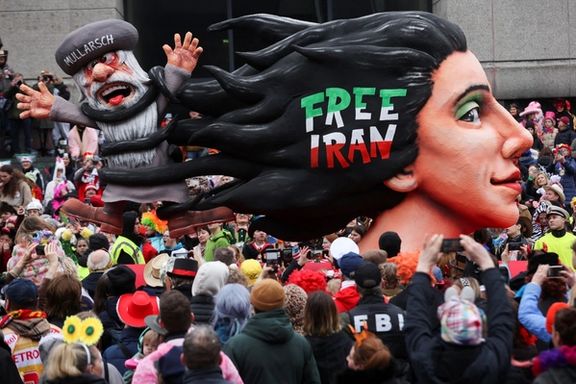
Also on Monday, the EU sanctioned 32 Islamic Republic officials, including culture and education ministers, deputy IRGC commander, and several MPs. The move can be seen as a measure to justify the fact that the EU is not yet ready to designate the entirety of the IRGC.
European Commission President Ursula von der Leyen said last week that the EU would propose sanctions targeting for the first time Iranian economic operators involved in the Russian war in Ukraine. "For the first time we are also proposing to sanction Iranian entities including those linked to Iran's Revolutionary Guard," she said.
In January, the block's foreign policy chief Josep Borrell said that the European Union cannot list the IRGC as a terrorist entity until an EU court has determined that they are, noting "Ministers adopted a new package of sanctions against Iran, targeting those driving the repression. The EU strongly condemns the brutal and disproportionate use of force by the Iranian authorities against peaceful protesters," he said but no action was taken to designate the IRGC.
There have been numerous Iranian terror acts in Europe, where courts have indicted top officials. In addition, IRGC’s record in organizing attacks elsewhere are well-documented. Critics say that Borrell is focused on re-starting nuclear talks with Iran after the previous long round of negotiations in 2021-2022 ended last September without success.
The European Parliament has called on the EU to list the Revolutionary Guards as a terrorist entity, blaming it for the repression of domestic protests and the supply of drones to Russia.
Moreover, EU legal experts have declared that the bloc does not currently have legal grounds to list Iran's Revolutionary Guards as a terrorist organization, German Foreign Minister Annalena Baerbock said on Monday.
"As of now, we don't have legal grounds in the EU to list the Revolutionary Guards as a terrorist organization," Baerbock told reporters at the end of a meeting of EU foreign ministers in Brussels.
The United States has said it is not pursuing the revival of the 2015 nuclear deal, or the JCPOA, and instead its attention is on the popular movement in Iran and on Tehran’s supply of kamikaze drones to Russia.
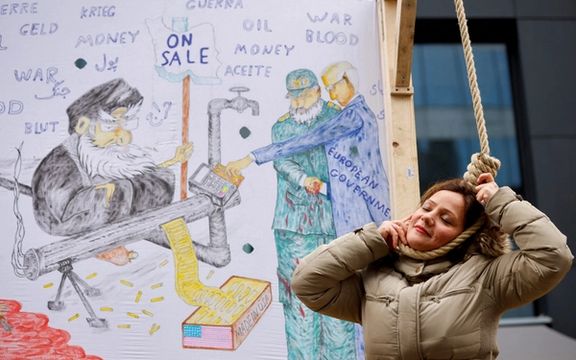
The IRGC was set up shortly after the 1979 Islamic Revolution to protect the Shi’ite clerical ruling system and provide a counterweight to the regular armed forces.
It has an estimated 125,000-strong military with army, navy and air units. It also commands the Basij religious militia, a volunteer paramilitary force loyal to the clerical establishment which is often used to crack down on anti-government protests.
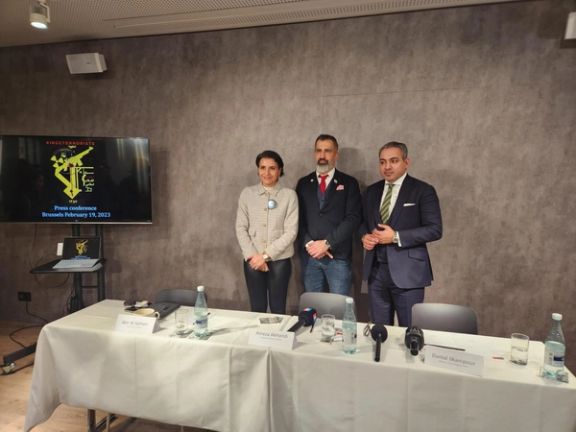
After a weekend of success for the Iranian opposition at the Munich Security Conference, dissidents are preparing a large rally in Brussels on Monday.
Prominent dissident figures spoke to Iranian expatriates as well as reporters on Sunday after the Munich Security Conference snubbed Tehran by not inviting regime officials this year.
A protest rally has been planned for Monday, February 20, outside the European Parliament in the Belgian capital Brussels to call on the European Union countries to designate the Revolutionary Guard (IRGC) as a terrorist organization. Thousands of Iranians from all over Europe held a massive rally in Strasbourg in January for the same purpose.
Speaking at an event on the eve of the Brussels demonstration a member of the Swedish parliament Alireza Akhondi expressed appreciation for the invitation extended to Prince Reza Pahlavi, and activists Masih Alinejad and Nazanin Boniadi to attend the Munich conference this year instead of Tehran regime officials.
Danial Ilkhanipour, a German-Iranian member of the Hamburg city parliament, and Iraqi-born Swedish Member of the European Parliament, Abir Al-Sahlani also spoke at the press conference. The three urged unity among the Iranian opposition, emphasizing that a united opposition can prompt the EU and countries around the world to put pressure on the clerical regime.
Iran International’s correspondent Mosaddeq Parsa said the gist of the event was to highlight the significance of designating the IRGC as a terrorist organization, which will further isolate the Islamic Republic and curb its destabilizing activities across the region and the world.
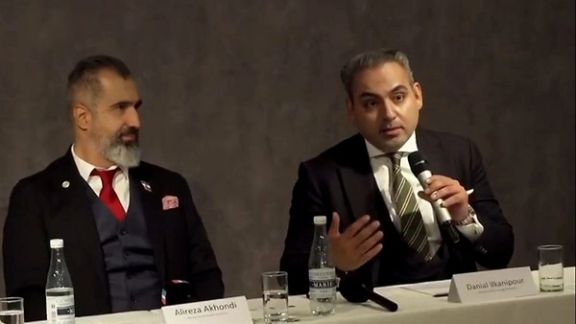
Akhondi touched upon the issue of regime threats against journalists at Iran International TV in London, which has caused the channel to temporarily relocate its studios to Washington DC. Akhondi that such threats are among the many reasons that European countries should list IRGC as a terror group.
"Declaring the Revolutionary Guards as terrorists is the finishing line of the Islamic Republic, that's why the intention of the Islamic Republic and the cyber army of the regime is to prevent our gatherings from growing bigger."
Al-Sahlani said that the IRGC is the cause of instability in the region and fuels military conflicts, adding that its designation by the European Union will lead to stability in the region. Everywhere in the Middle East where war, killing, repression and crime occur, traces of the Islamic Republic can be seen, she noted.
Earlier in the day, Alinejad appeared among the supporters of the exiled prince in Munich to reiterate solidarity of the Iranian opposition figures against the Islamic Republic. Pahlavi, who used to be seen as a solo actor determined to bring about the end of the Islamic Republic, has recently united with other top Iranian opposition figures with the same goal. Since a historic forum in Washington was held earlier this month, the dissident activists have been participating in events around the world to make the voice of the Iranian opposition heard. Such events signal the emergence of a leadership council in the diaspora to campaign for international support in favor of Iran’s protest movement.
According to Iran International’s correspondent in Munich, Ahmad Samadi, Alinejad also stressed the necessity of unity among all Iranians inside the country and abroad, regardless of differences to speed up the fall of the regime.
In an interview with Politico, Pahlavi called on the United States and Europe to help the Iranian people and the newly unified opposition exploit cracks in Iran’s leadership. Appreciating the sanctions already in place, he said that “The next level would be to target the Islamic Revolutionary Guard Corps to go after specific individuals and their assets abroad.”
“Frozen assets of the regime can be used, which is the Iranian people’s money. That money can be repurposed. We’re not asking for Germans to put money in the Iranian people’s pocket. It’s just a matter of making the decision to use the assets which are already there. I’m sure there should be some options of making exceptions to the sanctions to bring the money to the people, not to the dictator,” he added.